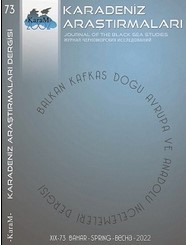ATASÖZLERİNDEN ÖRNEKLERLE KAZAN-TATAR TÜRKLERİNİN GELENEKSEL DÜNYA GÖRÜŞÜNDE İYİ(LİK) VE KÖTÜ(LÜK)
GOOD AND EVIL IN THE TRADITIONAL WORLD VIEW OF THE KAZAN-TATAR TURKS ACCORDING TO PROVERBS
Author(s): Fatma TekinSubject(s): Cultural history, Comparative history, Oral history
Published by: Karadeniz Araştırmaları Merkezi
Keywords: Proverbs; Traditional world view; Kazan-Tatar Turks; Good; Evil;
Summary/Abstract: Proverbs play important function alongside traditional narratives (e.g. myths, tales, legends) in that sense. They are symbolic images that reflect the perceptions, way of thinking, and understanding of a particular society, including their cultural and behavioural patterns. In the context of the Kazan Tatars, they give us a gimps into how they understand good and evil. This study will focus on examining just that – through 145 Kazan Tatar proverbs, sourced from volume three of Tatar Halık Mekalleri (Tatar People's Proverbs) by Nekıy İsenbet. Our findings reveal that proverbs constitute the essence of the Kazan Tatars’ traditional world view and folk philosophy. They are clear codes that reflect their socio-cultural values and norms system, in relation their understanding of good and bad. They moreover appear to serve as an instructional function: they carry wisdom meant to be handed down intergenerationally. They teach individuals how they ought to be have, how to recognize good from bad, and encourage them to always seek good, truth and beauty.
Journal: Karadeniz Araştırmaları
- Issue Year: 2022
- Issue No: 73
- Page Range: 167-182
- Page Count: 16
- Language: Turkish

